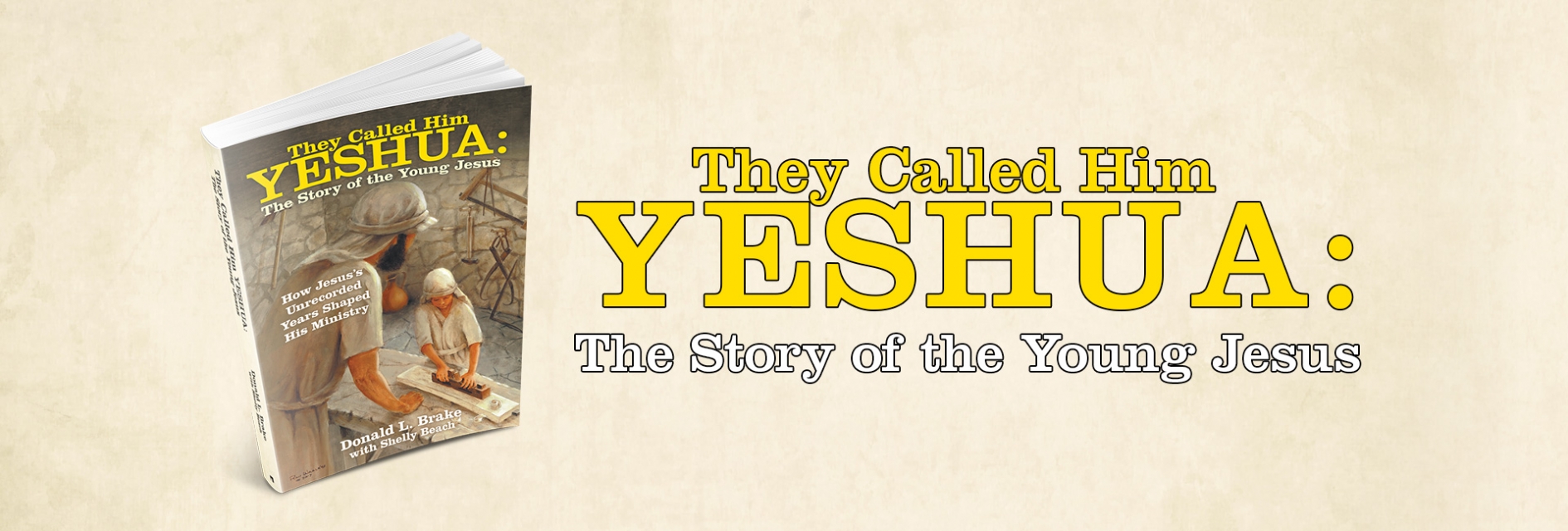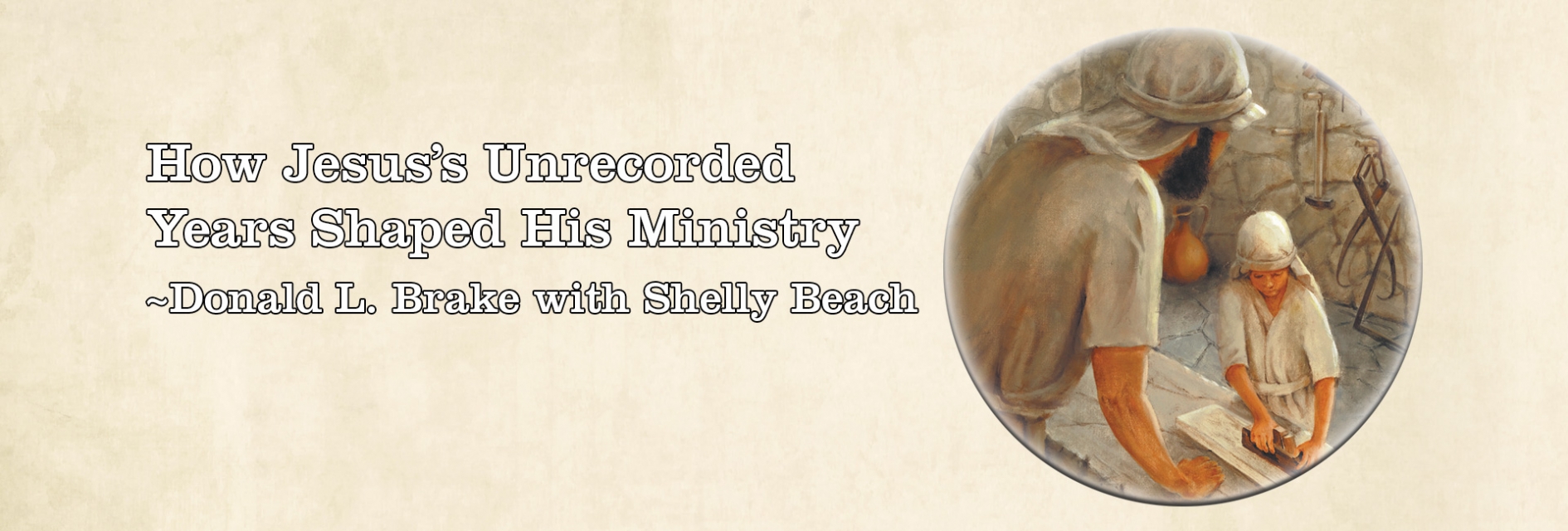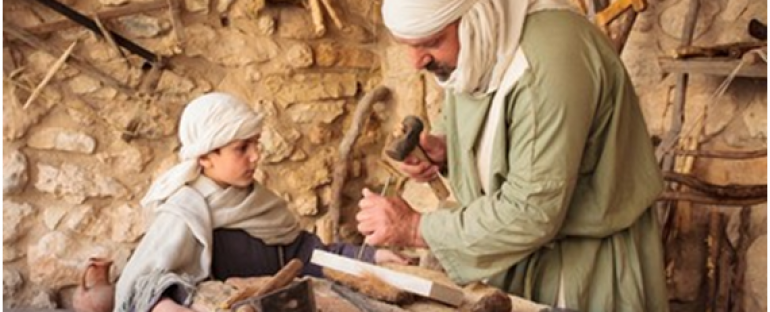

They Called Him Yeshua: The Story of the Young Jesus
Donald L Brake with Shelly Beach
“They Called Him Yeshua.” As one internet critic of the title wrote, “The Bible said they called Him Jesus.” One thing for sure they didn’t call Him “JESUS.” The English “Jesus” was not a language for centuries later. No doubt they called Him by His Hebrew name “Yeshua.”
Who is this man they called Yeshua? As another reviewer pensively put it, “What are the startling implications if Jesus was never a hypocrite? What if he didn’t waste the first thirty years of his life here on earth?” As Scriptures say, “Jesus also did many other things. If they were all written down, I suppose the whole world could not contain the books that would be written. John 21:25
What did happen during those thirty missing years?
Believers, ever curious, long for intimate details about our beloved Savior, or the story behind the story, to understand not just biblical events but also what led to them. Jesus often used past events, cultural stories, and everyday incidents for His parables and sermons.
Make no mistake, the canonical Gospels reveal all the information we need to know about the Savior and His plan of redemption. We need no more. But we know almost nothing about the first 30 years of Jesus life. We get some detail about His birth and a glimpse of Him at 12 years old at the temple in Jerusalem. After that the Bible is silent until his baptism.
Some authors dared to delve into the possibilities of his childhood. Anne Rice in her book Chris the Lord: Out of Egypt portrays the 7-year old Jesus as making sparrows out of clay and by looking at them they flew away (immortalized in New Testament apocryphal) and when accused of killing the boy Eleazar, He brought him back to life. Jesus’s brothers, mentioned in the New Testament, were Joseph’s by a previous marriage.
Marjorie Holmes’ Three from Galilee valiantly tries to expand fictional knowledge of the young Jesus, but fails at historical and cultural realism. Jesus becomes more of a shepherd than a carpenter totally unaware of His divine mission until after a torrid love affair with Tamara (sensuously described, some would say sinful behavior with little care for a realistic first century romantic encounters with proper chaperons). It was Mary who convinced Jesus of his divine messianic mission.
Mesu Andrews sums up what I am trying to accomplish, “Dr. Brake’s first novel is a powerful glimpse into both the deity and humanity of Jesus, the Christ. Written from the perspectives of a young Joseph and Mary, this book takes us into the volatile world of the Roman occupation and the emotional upheaval of two people charged with the impossible task of parenting the Son of God.
… Dr. Brake lived in Israel for several years and I’d read his scholarly non-fiction, I was confident his research and accuracy would be faultless. His “world-building” descriptions were wonderful, placing me in the moment with Joseph and Mary’s families as they experienced Rome’s cruelty and Herod’s impulsiveness.”
I think David Sanford captured exactly the spirit of the book, “With biblical and historical accuracy, insightful sanctified imagination, and brilliant storytelling, Brake and Beach foreshadow what we know with certainty from the New Testament. Get ready for epiphanies aplenty.” My plot and story are directly governed by what we know from the New Testament.
The Scriptures record: “And Jesus grew in wisdom and stature, and in favor with God and man” (Luke 2:52). Of course, we all have asked the same questions: How could Jesus be both God and man? Did he have a split personality? Was he schizophrenic? How could He be God as a baby? How can God grow in wisdom and stature? Was he tempted to evil prior to His wilderness temptation as an adult? Did Jesus ever become sick? What did his family and friends think when he forsook Jewish tradition that called for young men to establish a family? Why did his brothers not believe in him? Did he know the disciples before calling them? How did they know he was a teacher? What part did Mary and Joseph play in his development? Did Jesus have a split nature–God-man? How could he display a healthy humanity but remain sinless? Did he slowly become aware of his mission as his intellect and emotions matured? Did he offer sacrifices and pay taxes? How did John the Baptist know Jesus was the Messiah? How did the Essenes affect New Testament teachings? Was John a member? What role did Mary Magdalene play? Did Jesus ever have romantic encounters? These questions and others are confronted as we walk beside Jesus, his friends and family, and revisit their world through their eyes.
The reader will find the book to be honest about the universality of human emotions and the struggles Jesus’ family faced. Above all, it is the authors’ desire that your love and gratitude may be stirred toward the Creator-God who sacrificed His Son as a lowly man, to become your Savior.
In the fourth watch of the night, Mary nudged Joseph. He
moaned and rolled farther from her. She poked him sharply
in the ribs.
“It’s time, Joseph!”
This time he sat bolt upright. “Tonight? In a stable?
I thought perhaps in a few days I could secure better
lodging …”
Mary cut him off. “No, now! The baby is coming, and he’s
not waiting for anyone.” Mary tried to hide her fear. The pain
was more than she’d expected. “Get Deborah.”
Joseph leaped to his feet and headed to the kitchen,
where intoxicating aromas had already told Mary that
Deborah was preparing the day’s menu for the many guests.
Deborah rushed into the darkness of the cave. Mary
was now feeling the pain and pressure of cramps every
few minutes. Deborah ordered Joseph to stay with his wife
and comfort her while she brought lamps and gathered the
birthing materials.
Mary squeezed Joseph’s hand with the pain of each contraction
and struggled not to cry out. She moaned, praying
silently that the baby would come.
Deborah settled into place and pointed at Joseph in the
wavering light. “You. Out. I will let you know when Mary has
delivered and when you can see the baby. Your wife and I
have work to do. Now go!”
Deep, throbbing pain. A teeth-gritting, agonizing push,
followed by several more. Then a tiny cry, and Mary forced
her tiny son from the safety of her womb into the world.
Deborah cradled him briefly in her arms, then placed the
infant in Mary’s arms. A moment later, Joseph was at her side.
God had chosen the baby’s name before the foundations
of the world: Yeshua.
Mary asked Joseph to bring a blanket she and Elizabeth
had woven by hand months before. She lovingly swaddled
Yeshua, making sure the blanket was snug against his
body. Then Mary slipped the baby into Joseph’s waiting
arms as Deborah gathered her supplies and disappeared
back into the house.
“They both need rest,” Deborah called over her shoulder.
“Especially your wife.”
But Mary’s maternal instincts were not to be quelled.
“Joseph, I’m sorry, I need him back for a few more minutes.
Then he leaned forward and stroked Mary’s cheek.
“Do you know how brave you are? The trip was hard. I can
only imagine the pain you endured. Are you going to be
all right?” His tone reflected concern, but Mary’s attention
focused on the tiny hand wrapped around her little finger.
Yeshua had already captured her heart.
“Pain, yes. But Joseph … there are no words for this
feeling. He is beautiful, and he is here. But what does the future
hold? The questions in my mind seem too great to even
imagine. I am sometimes afraid … but I do not doubt God.”
She snuggled her newborn son to her breast and gently
kissed him on his forehead and watched his wee eyes
struggling to remain open. She whispered, “Do you know
what lies ahead for you? The burden you must carry for all
mankind—the Savior of the world?”
A cloud of sorrow suddenly hung over her joy as she grappled
with the mysteries of the future for her precious Yeshi.
But then, the music of God’s hosts of heaven echoed in the
stillness a calm resolve and she quietly hummed words that
were running through her mind:
Joseph leaned down and kissed her on the forehead.
“God does not mind our questions, as long as they do not
stand in the way of our obedience. Together we have pledged
to raise Yeshua to honor and obey God as best we can.”
Mary scooped out a tiny nest of hay beside her and laid
the swaddled Yeshua where both Joseph and she could see
him. Whatever destiny God had ordained for him, that day
was far off.
Today he was a newborn, and she was a new mother.
“Though he was God, he did not think of equality with God as something to cling to.
Instead, he gave up his divine privileges; he took the humble position of a slave and was born as a human being. When he appeared in human form, he humbled himself in obedience to God and died a criminal’s death on a cross.” (Philippians 2:6-8)
Jesus changed the course of human history, and His incomparable influence is validated every time we record a date or glance at a calendar. His parting words promised He would return. The world is a better place because of this man “They Called Yeshua.”
“What we do see is Jesus, who for a little while was given a position a little lower than the angels; and because he suffered death for us, he is now crowned with glory and honor.” (Hebrews 2:9)
Young Jesus
About the Author
Written by Donald L. Brake Sr.
Donald L. Brake Sr., PhD, Dallas Theological Seminary; Dean Emeritus, Multnomah Biblical Seminary of Multnomah University. A former pastor, he lives with wife Carol, in Lewisville, Texas. The author has served as a Missionary in Ethiopia, SIM; Professor of Theology, Multnomah Biblical Seminary; Pastor, North Carrollton Baptist Church; President, Institute of Holy Land Studies (now Jerusalem University College; and dean Multnomah Biblical Seminary; and co-founder Living Word Bible Museum. He currently is a freelance writer. The author’s experience as president of the Institute in Jerusalem has given him insight into the historical, cultural, and geographical background of Israel and the life of Christ. Dr. Brake has led tours to the Holy Land and has taught the life of Christ and the Bible’s historical/cultural backgrounds for more than thirty-five years. Dr. Brake wrote a series of fifteen articles for the St. Louis Metro Voice and has published the Wycliffe New Testament. His book A Visual History of the English Bible was published in 2008 (a 2009 Evangelical Christian Publishers Association Christian Book Award finalist); Jesus, a Visual History with Todd Bolen, 2014; A Monarch’s Majestic Translation, in 2017; and A Visual History of the King James Bible, in 2011 (with Shelly Beach; also translated into Portuguese as "Uma Historia Visual Da Biblia King James"), a commemorative edition celebrating four hundred years of the King James Version. His major article “Versions, English” was published in The Interpreters Dictionary of the Bible, vol. volume 5, Abington Press. His most recent work is They Called Him Yeshua: the Story of the Young Jesus, 2019.


